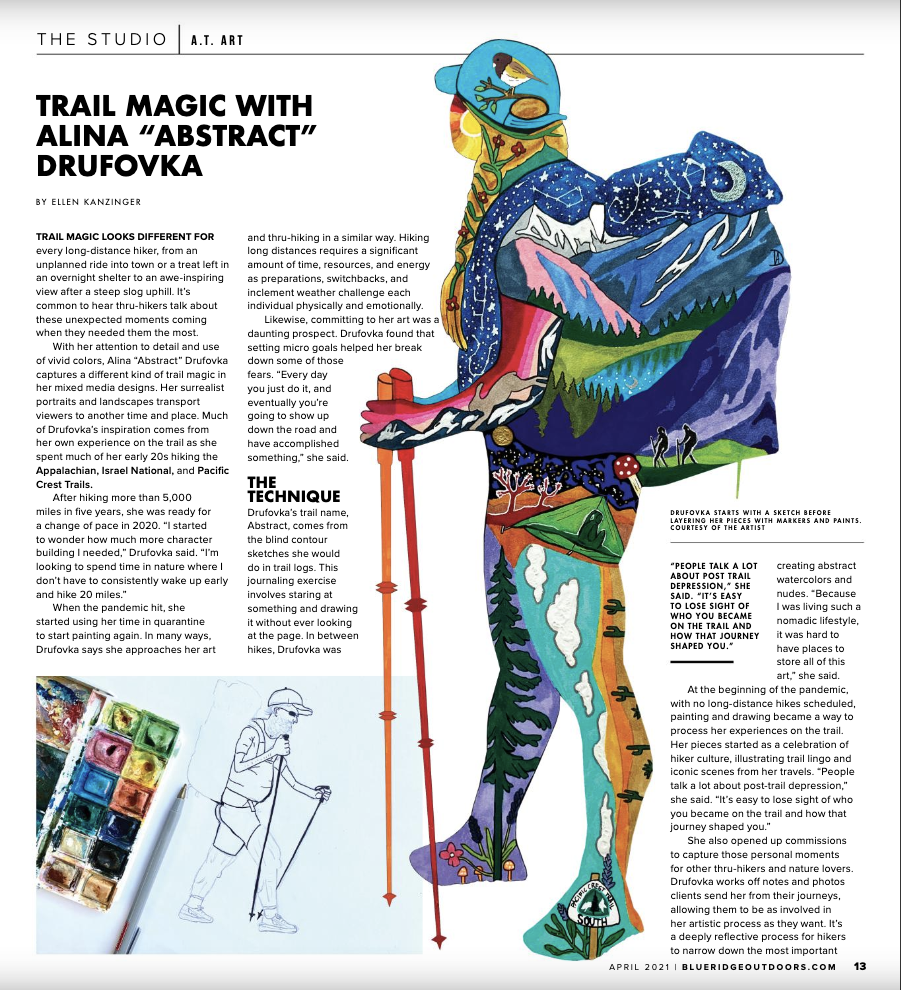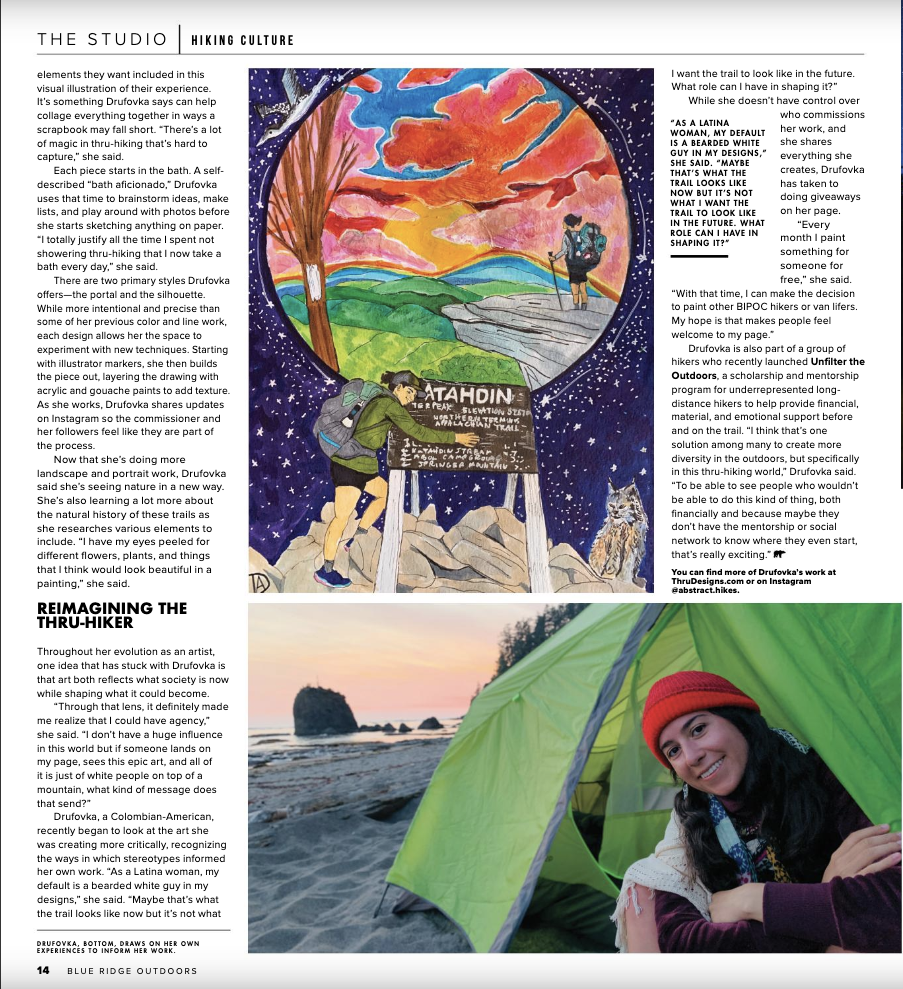Trail Magic with Alina “Abstract” Drufovka
Trail magic looks different for every long-distance hiker, from an unplanned ride into town or a treat left in an overnight shelter to an awe-inspiring view after a steep slog uphill. It’s common to hear thru-hikers talk about these unexpected moments coming when they needed them the most.
With her attention to detail and use of vivid colors, Alina “Abstract” Drufovka captures a different kind of trail magic in her mixed media designs. Her surrealist portraits and landscapes transport viewers to another time and place. Much of Drufovka’s inspiration comes from her own experience on the trail as she spent much of her early 20s hiking the Appalachian, Israel National, and Pacific Crest Trails.
After hiking more than 5,000 miles in five years, she was ready for a change of pace in 2020. “I started to wonder how much more character building I needed,” Drufovka said. “I’m looking to spend time in nature where I don’t have to consistently wake up early and hike 20 miles.”
When the pandemic hit, she started using her time in quarantine to start painting again. In many ways, Drufovka says she approaches her art and thru-hiking in a similar way. Hiking long distances requires a significant amount of time, resources, and energy as preparations, switchbacks, and inclement weather challenge each individual physically and emotionally.
Likewise, committing to her art was a daunting prospect. Drufovka found that setting micro goals helped her break down some of those fears. “Every day you just do it, and eventually you’re going to show up down the road and have accomplished something,” she said.
The Technique
Drufovka’s trail name, Abstract, comes from the blind contour sketches she would do in trail logs. This journaling exercise involves staring at something and drawing it without ever looking at the page. In between hikes, Drufovka was creating abstract watercolors and nudes. “Because I was living such a nomadic lifestyle, it was hard to have places to store all of this art,” she said.
At the beginning of the pandemic, with no long-distance hikes scheduled, painting and drawing became a way to process her experiences on the trail. Her pieces started as a celebration of hiker culture, illustrating trail lingo and iconic scenes from her travels. “People talk a lot about post-trail depression,” she said. “It’s easy to lose sight of who you became on the trail and how that journey shaped you.”
She also opened up commissions to capture those personal moments for other thru-hikers and nature lovers. Drufovka works off notes and photos clients send her from their journeys, allowing them to be as involved in her artistic process as they want. It’s a deeply reflective process for hikers to narrow down the most important elements they want included in this visual illustration of their experience. It’s something Drufovka says can help collage everything together in ways a scrapbook may fall short. “There’s a lot of magic in thru-hiking that’s hard to capture,” she said.
Each piece starts in the bath. A self-described “bath aficionado,” Drufovka uses that time to brainstorm ideas, make lists, and play around with photos before she starts sketching anything on paper. “I totally justify all the time I spent not showering thru-hiking that I now take a bath every day,” she said.
There are two primary styles Drufovka offers—the portal and the silhouette. While more intentional and precise than some of her previous color and line work, each design allows her the space to experiment with new techniques. Starting with illustrator markers, she then builds the piece out, layering the drawing with acrylic and gouache paints to add texture. As she works, Drufovka shares updates on Instagram so the commissioner and her followers feel like they are part of the process.
Now that she’s doing more landscape and portrait work, Drufovka said she’s seeing nature in a new way. She’s also learning a lot more about the natural history of these trails as she researches various elements to include. “I have my eyes peeled for different flowers, plants, and things that I think would look beautiful in a painting,” she said.
Reimagining the Thru-Hiker
Throughout her evolution as an artist, one idea that has stuck with Drufovka is that art both reflects what society is now while shaping what it could become.
“Through that lens, it definitely made me realize that I could have agency,” she said. “I don’t have a huge influence in this world but if someone lands on my page, sees this epic art, and all of it is just of white people on top of a mountain, what kind of message does that send?”
Drufovka, a Colombian-American, recently began to look at the art she was creating more critically, recognizing the ways in which stereotypes informed her own work. “As a Latina woman, my default is a bearded white guy in my designs,” she said. “Maybe that’s what the trail looks like now but it’s not what I want the trail to look like in the future. What role can I have in shaping it?”
While she doesn’t have control over who commissions her work, and she shares everything she creates, Drufovka has taken to doing giveaways on her page.
“Every month I paint something for someone for free,” she said. “With that time, I can make the decision to paint other BIPOC hikers or van lifers. My hope is that makes people feel welcome to my page.”
Drufovka is also part of a group of hikers who recently launched Unfilter the Outdoors, a scholarship and mentorship program for underrepresented long-distance hikers to help provide financial, material, and emotional support before and on the trail. “I think that’s one solution among many to create more diversity in the outdoors, but specifically in this thru-hiking world,” Drufovka said. “To be able to see people who wouldn’t be able to do this kind of thing, both financially and because maybe they don’t have the mentorship or social network to know where they even start, that’s really exciting.”
You can find more of Drufovka’s work at ThruDesigns.com or on Instagram @abstract.hikes.
This article originally appeared in Blue Ridge Outdoors Magazine’s April 2021 issue.

